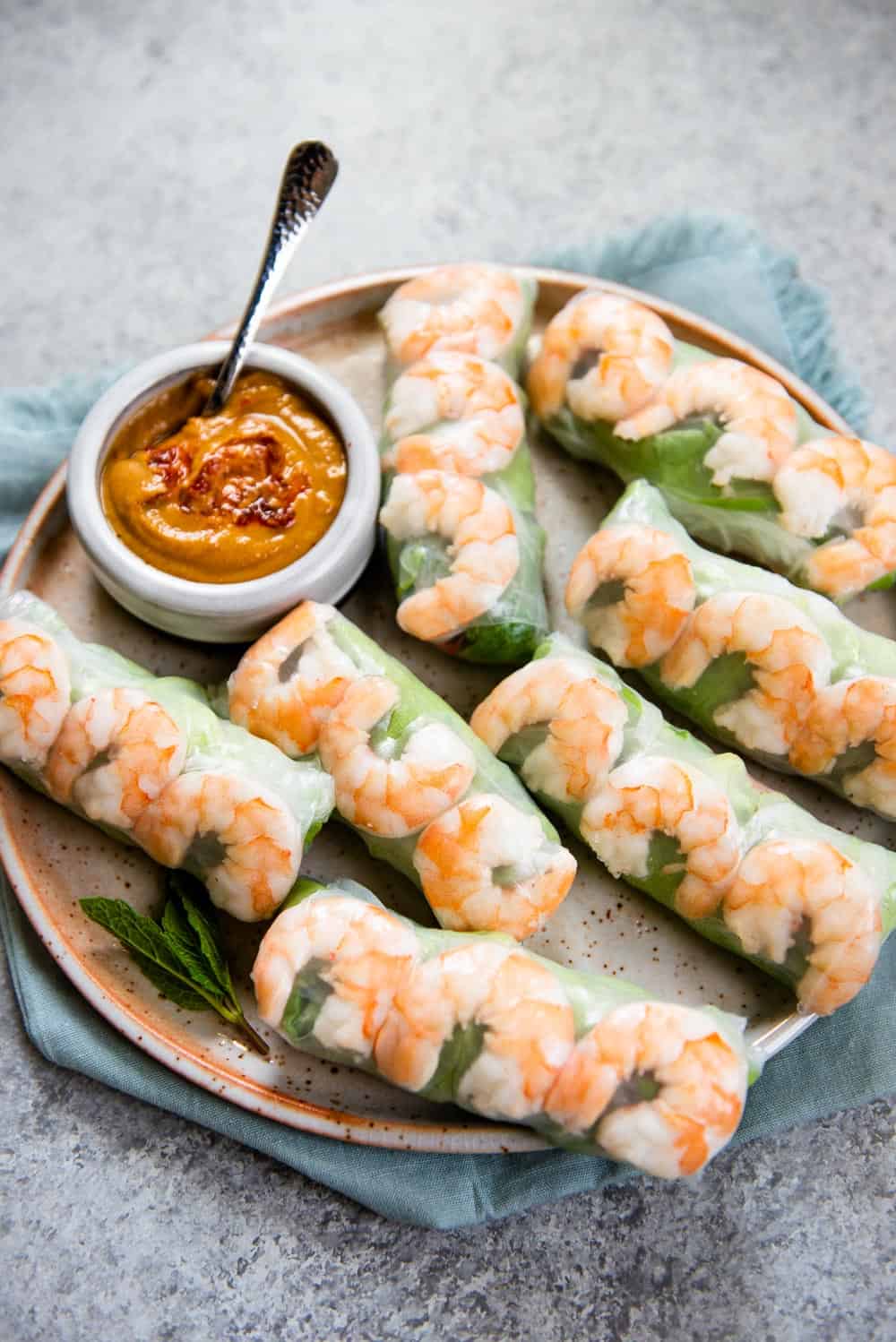
In Vietnamese, fresh spring rolls made with rice paper are called gỏi cuốn, translating to “salad rolls” (gỏi is means “salad” and cuốn means “to coil” or “to roll”). I don’t speak Vietnamese, but if you are interested in learning how to pronounce gỏi cuốn, watch this video! The presenter breaks down the pronunciation of various Vietnamese foods very well.
Typically, you’ll find Vietnamese spring rolls filled with shrimp, pork vegetables, herbs and rice vermicelli. In this spring roll recipe, I’m primarily using shrimp, vegetables, herbs, and noodles for the filling. Feel free to add or replace ingredients based on your preferences and what’s available to you.
WHAT YOU NEED TO MAKE VIETNAMESE SPRING ROLLS
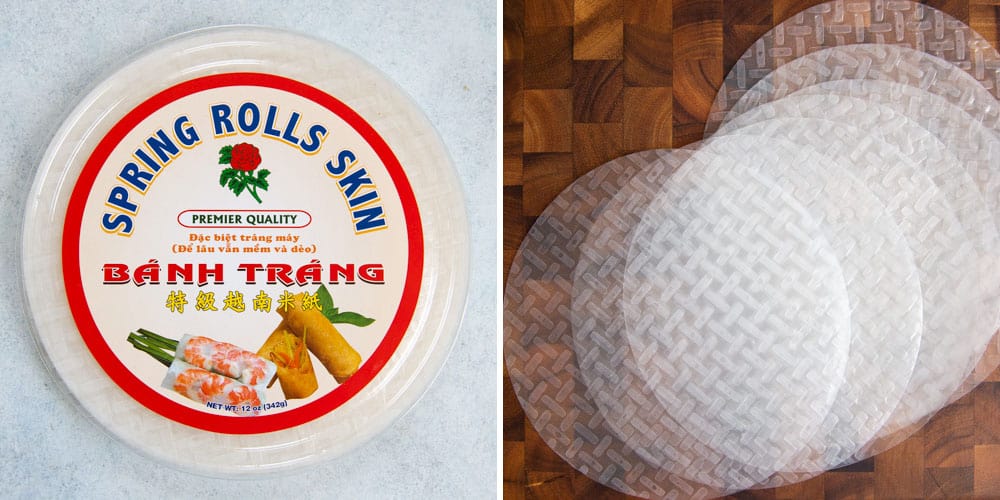
RICE PAPER (Bánh Tráng)
I like using larger circular rice papers (22cm, about 8.5 inches) because they hold more filling. As an aside, most rice paper sheets are produced in Asia, so you’ll likely see them labeled with metric measurements. Smaller rice paper sheets also work for this recipe, but your spring rolls will be much smaller.
My favorite brand of rice paper is the Three Ladies Brand because they tend to stretch better and are less likely to tear. On their packaging, you’ll see a drawing of three ladies, and you can find them at Asian supermarkets or on Amazon. If I don’t have time to go to an Asian supermarket, I will buy the brand photographed above from Raley’s or a similar grocer. For more information about various rice paper brands, check out this comprehensive guide from Andrea Nguyen.
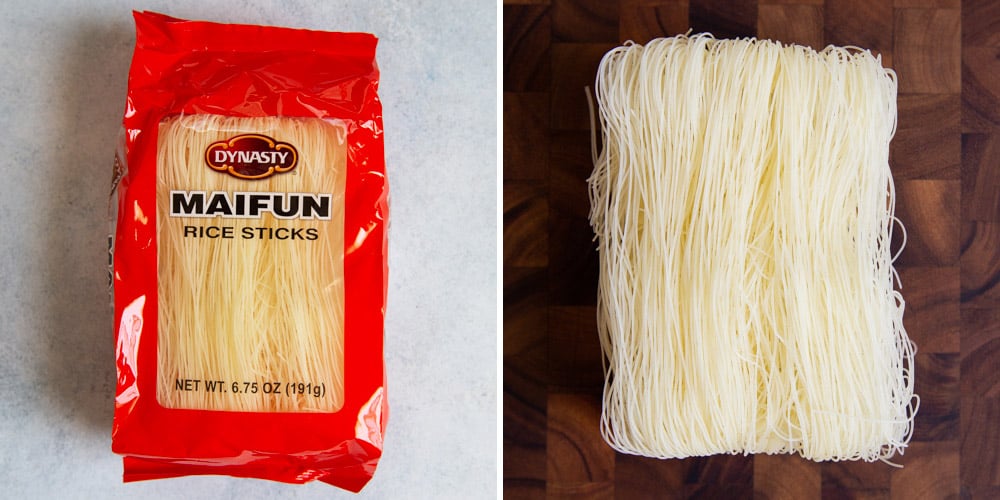
RICE VERMICELLI
Typically, Vietnamese spring rolls are made with rice vermicelli, which are very thin rice noodles. Various manufacturers will call them thin rice noodles, rice sticks, or maifun. One important thing to note is that the cooking time of the noodles varies across brands. Use my recipe below as a guide, but double check the manufacturer’s suggested cooking time.
SHRIMP
Medium-sized shrimp (about 21 to 25 count) work best for spring rolls. I like cooking the shrimp with the shells on because I think the color of the shrimp is more vibrant once cooked. The easiest way to cook the shrimp is to boil them for two minutes. Then, remove the shrimp from the boiling water and let them cool for at least 5 minutes before peeling off the shells.
LETTUCE LEAVES
Many Vietnamese spring roll recipes use lettuce leaves because they help make the rolling process much easier. When you nestle the noodles, vegetables, and herbs inside the lettuce leaf, the filling won’t spread out everywhere as you roll up the spring roll. Plus, the lettuce offers a nice color contrast to the shrimp.
I prefer to use butter lettuce because the circular leaves are perfectly shaped for spring rolls. If butter lettuce is not easy to find, feel free to use red leaf or green leaf lettuce. Remember to snap off the bottoms of the leaves to get rid of the tougher stem. The stems can easily poke through the rice paper once the spring rolls are rolled up.
VEGETABLES AND HERBS
Although I like the combination of carrots, cucumber, bell pepper, and mint, use whatever you prefer. Sometimes, I’ll throw in red cabbage, sliced avocado, or basil. The sky is the limit in terms of the ingredients you can use for spring rolls! Make sure to slice the vegetables thinly so that they are easier to chew.
HOW TO MAKE VIETNAMESE SPRING ROLLS
SET UP THE WORK SURFACE
I usually roll spring rolls on top of a chopping board. To prevent the rice paper from adhering to the board, I quickly wet the board by brushing water over it with my hand. After every two spring rolls or so, I will wet the board again.
Alternatively, you can lay a damp towel over your work surface and roll the spring rolls directly on the towel. Mama Lin prefers this method because you don’t have to constantly brush water over the board.
VIDEO: ROLLING TECHNIQUE FOR VIETNAMESE SPRING ROLLS
DIP THE RICE PAPER IN LUKEWARM WATER
To soften dry rice paper, quickly dip the rice paper in a bowl of lukewarm water, no longer than a few seconds. Don’t worry if the paper feels stiff when you take it out of the water. The rice paper will continue to soften on the chopping board. If you find that the rice paper is wrinkling and softening too quickly, the water may be too hot. Add some cold water to the bowl.
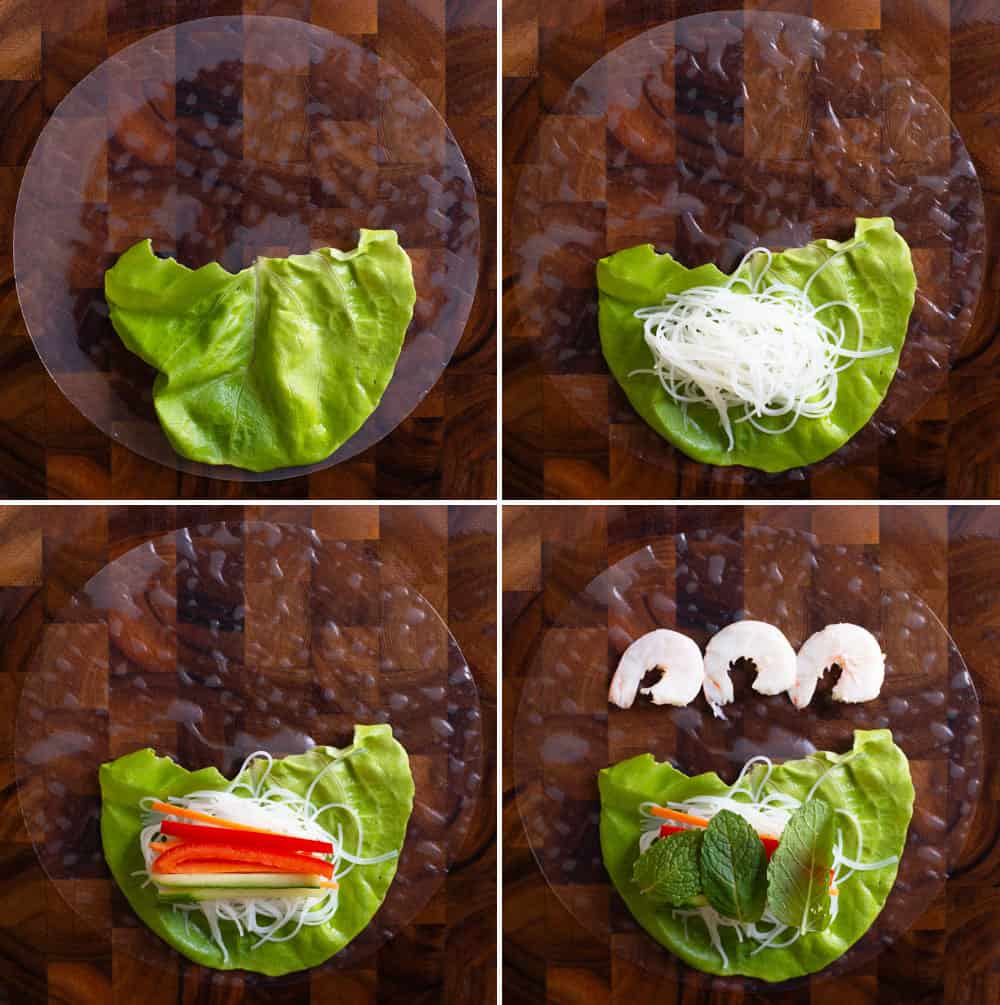
ADD THE FILLING
Lay a piece of butter lettuce over the lower edge of the rice paper. Then, top the lettuce with noodles, vegetables, and mint. Next, line the shrimp about 1 1/2 inches below the top edge of the rice paper. By leaving a gap between the shrimp and vegetables, the shrimp will look more vibrant in the final roll because they will be covered by only one layer of rice paper.

ROLL THE SPRING ROLL
When you are ready to roll the spring roll, grab the lower edge of the rice paper with your thumbs and pointer fingers, lift, and roll up the spring roll. Use your other fingers to hold the filling together. Continue rolling the spring roll until you reach the shrimp.
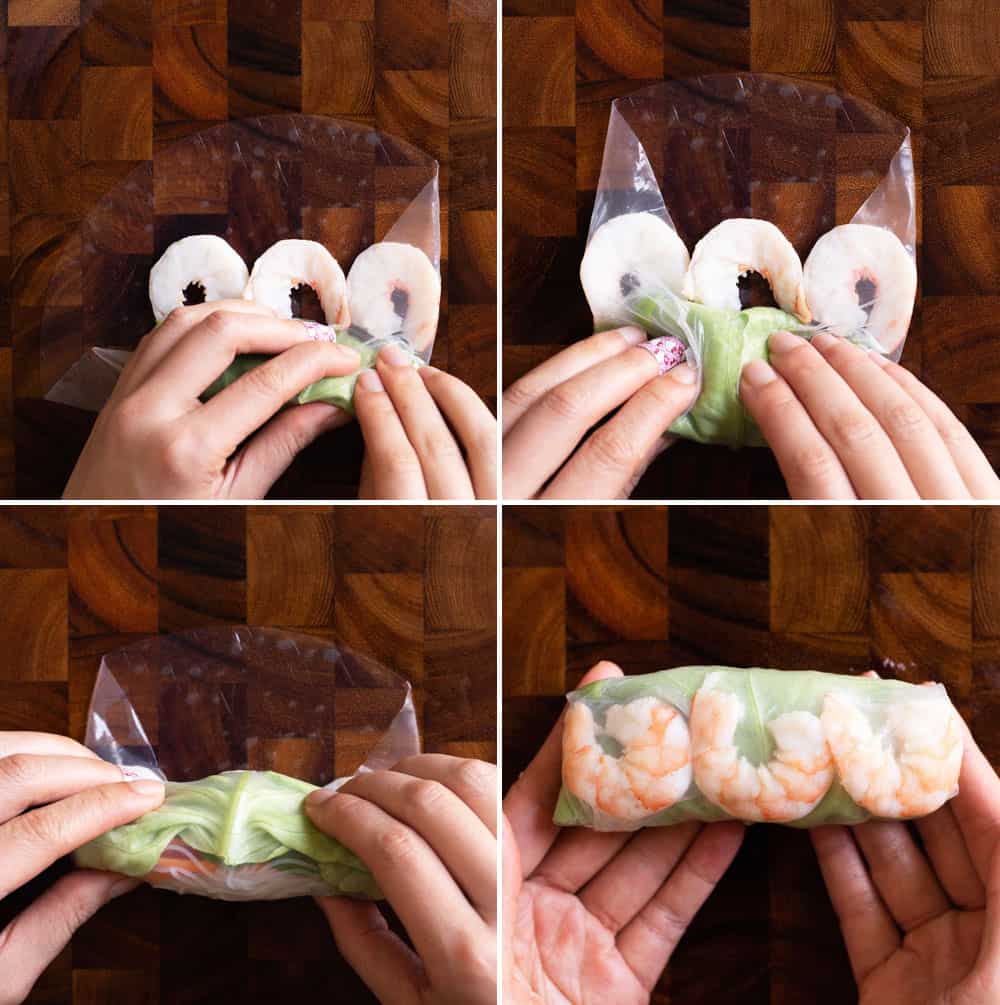
Then, fold the left and right sides of the spring roll toward the center (see photographs above). Finally, roll the spring roll all the way to the end.
CAN YOU MAKE FRESH SPRING ROLLS AHEAD?
Although you can prepare the filling and sauces up to 2 days ahead, I highly recommend that you consume these shrimp spring rolls within several hours of making them. If you refrigerate spring rolls overnight, the rice paper hardens, making them difficult to chew. You can microwave spring rolls on high for 30 seconds, but the texture won’t be the same as freshly made rolls. Another issue is that the rice paper tears over time over time, especially around the shrimp. For optimal texture and appearance, eat the spring rolls the same day you make them.
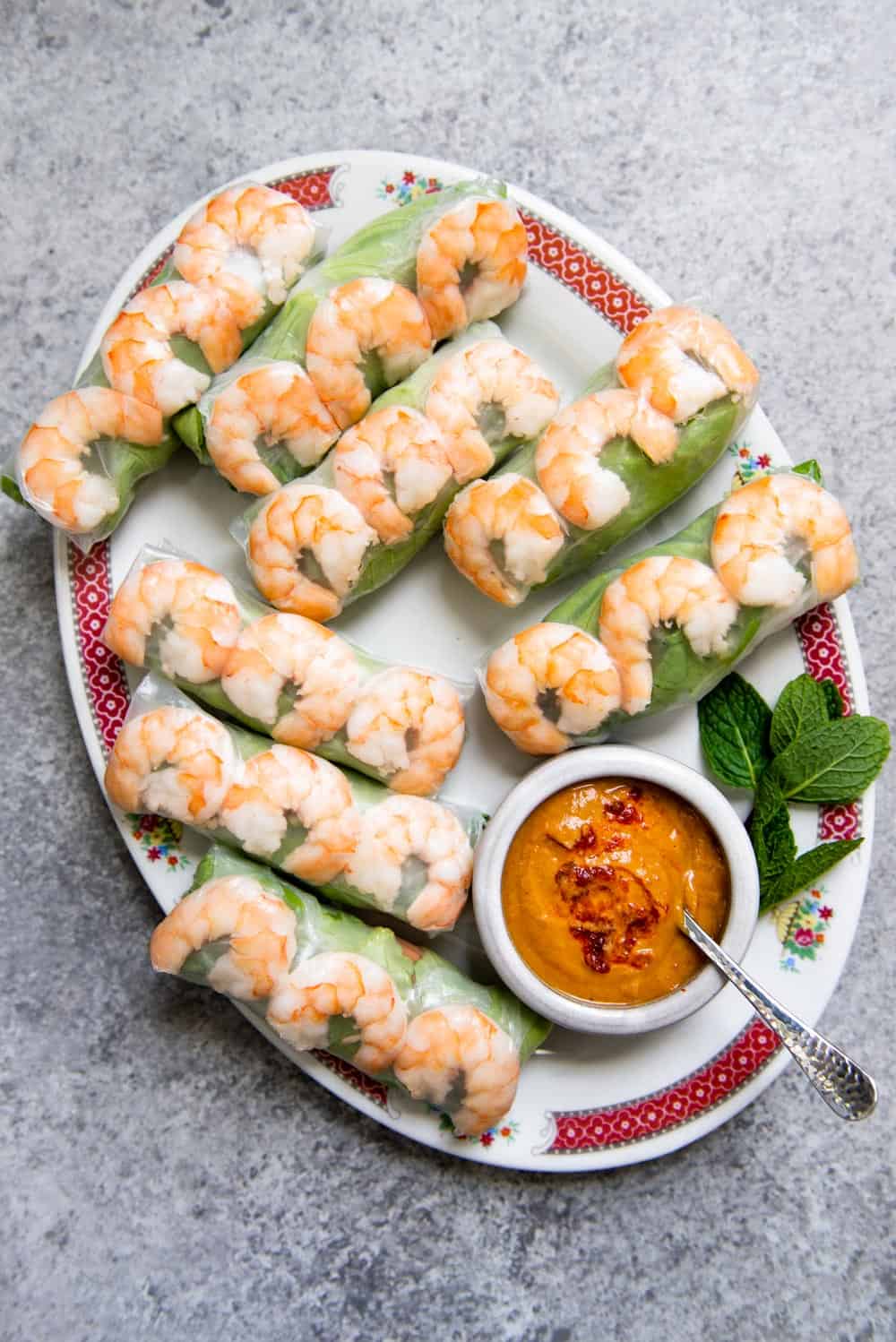
SPRING ROLL DIPPING SAUCE
Traditionally, spring rolls are served with nước chấm, a Vietnamese dipping sauce made of fish sauce, chilli, sugar, and lime juice. I have a recipe below for the nước chấm. I slightly prefer using a peanut sauce for this recipe because I love the richness of the peanut sauce contrasting with the texture of the fresh spring roll.
Fresh Vietnamese Spring Rolls
Ingredients
Spring Rolls
- 18 medium shell-on shrimp (21/25 count), about 3/4 pounds, defrosted if frozen
- 3 ounces thin rice vermicelli (maifun)
- 1 large carrot, peeled and cut into thin matchsticks
- 1 to 1 1/2 Persian cucumber, cut into matchsticks (see note 1)
- a large red bell pepper, cut into matchsticks
- 1/2 cup loosely packed mint leaves
- 12 pieces of butter lettuce, bottom tough stems removed (see note 2)
- 12 large 22cm circular rice paper sheets
- warm water for rolling spring rolls
Peanut Sauce (see note 3)
- 1/2 cup creamy peanut butter
- 1/2 cup filtered water
- 2 tablespoons rice vinegar
- 2 tablespoons soy sauce
- 1 1/2 to 2 tablespoons maple syrup, can sub with brown sugar (see note 4)
- 1 teaspoon toasted sesame oil
Nước Chấm
- 1/3 cup warm water
- 3 tablespoons sugar
- 2 tablespoons fish sauce, can add more to taste
- 1 tablespoon lime juice
- 1 Thai chilli, sliced
- a clove of garlic, minced
Instructions
Prepare the Dipping Sauce (see note 5)
- Pick your dipping sauce of choice above and mix all the sauce ingredients together. Make sure to use warm water for the nuoc cham so that the sugar dissolves more easily.
- Taste the sauce and adjust the seasonings as necessary.
- I like to prepare the sauce before making the spring rolls so that the flavors have a longer time to develop.
Prepare the Shrimp
- Fill a medium saucepan or small pot with water and bring it to boil on high heat (see note 6).
- Once the water boils, add the shrimp and cook for 2 minutes. Remove the shrimp from the water and let them cool for 5 minutes. Peel the shells from the shrimp.
- Lay a shrimp on its side on a chopping board. Gently press the shrimp down with one hand and use the other to slice the shrimp in half, horizontally (knife parallel to the chopping board). Repeat with the remaining shrimp.
Prepare the Noodles
- Fill a large saucepan or small pot with water and bring it to boil on high heat.
- Turn off the heat. Let the noodles sit in the hot water for about 5 to 8 minutes. Double check the package directions to see how long they should sit in hot water as the cooking time varies across different brands.
- Once the noodles have softened, drain and rinse the noodles under cold water. I like cutting the noodles with kitchen scissors several times so they are shorter and easier to grab.
Set Up Spring Roll Station
- Fill a large bowl with lukewarm water to wet the rice paper sheets.
- Transfer all the vegetables, shrimp, herbs, and noodles into bowls and arrange them on your work top.
- Get a chopping board ready. Dip your hand in the water and brush water over the surface of the chopping board so that it is damp. I usually wet the surface again after every 2 spring rolls. Alternatively, lay a damp paper towel over your work surface.
Roll the Spring Rolls (refer to the photo or video in the post for reference)
- Quickly dip a sheet of rice paper in the lukewarm water to moisten the entire surface. This should take no longer than a few seconds.
- Lay the wet rice paper on your work surface. Place a piece of butter lettuce close to the bottom edge of the rice paper. Arrange a small pinch each of rice noodles, carrots, cucumber, red bell pepper, and mint leaves over the center of the lettuce leaf (see note 7).
- Arrange 3 pieces of shrimp about 1 1/2 to 2 inches below the top edge of the rice paper. Make sure that the orange/pink side is facing down.
- Grab the lower edge of the rice paper and lettuce and start rolling up the spring roll. Once you have reached the shrimp, fold in the left and right sides. Finish rolling up the spring roll all the way to the end.
- Repeat the rolling process with the rest of the ingredients. If the chopping board is looking dry, brush some water over the board.
- Serve the spring rolls with the dipping sauce.
Video
Notes
- I know this is an awkward number for Persian cucumbers. However, they can be fairly small sometimes, so one will not be enough. Alternatively, you can use half of an English cucumber. Use the extra half cucumber for a salad or snack!
- Remove the stiff stems of the butter lettuce so that the stem doesn’t pierce through the rice paper once the spring rolls are rolled up. You can also use green leaf lettuce as a substitute. I would only use the tops of the lettuce and cut off the stiff stem.
- You can prepare the peanut sauce up to two days before, but the peanut sauce will become very thick in the refrigerator overnight. You can thin out the sauce with a little more water or heat it in the microwave for 20 to 30 seconds.
- If you are using brown sugar, dilute the sugar in warm water so that it dissolves completely.
- I like to prepare the sauce before making the spring rolls so that the flavors have a longer time to develop.
- I usually cook the shrimp and noodles simultaneously, so I have 2 saucepans ready with boiling water.
- If you are looking for more flavor inside the spring rolls, you can add a little hoisin sauce or peanut sauce over the noodles and vegetables before you roll everything up.
Nutrition
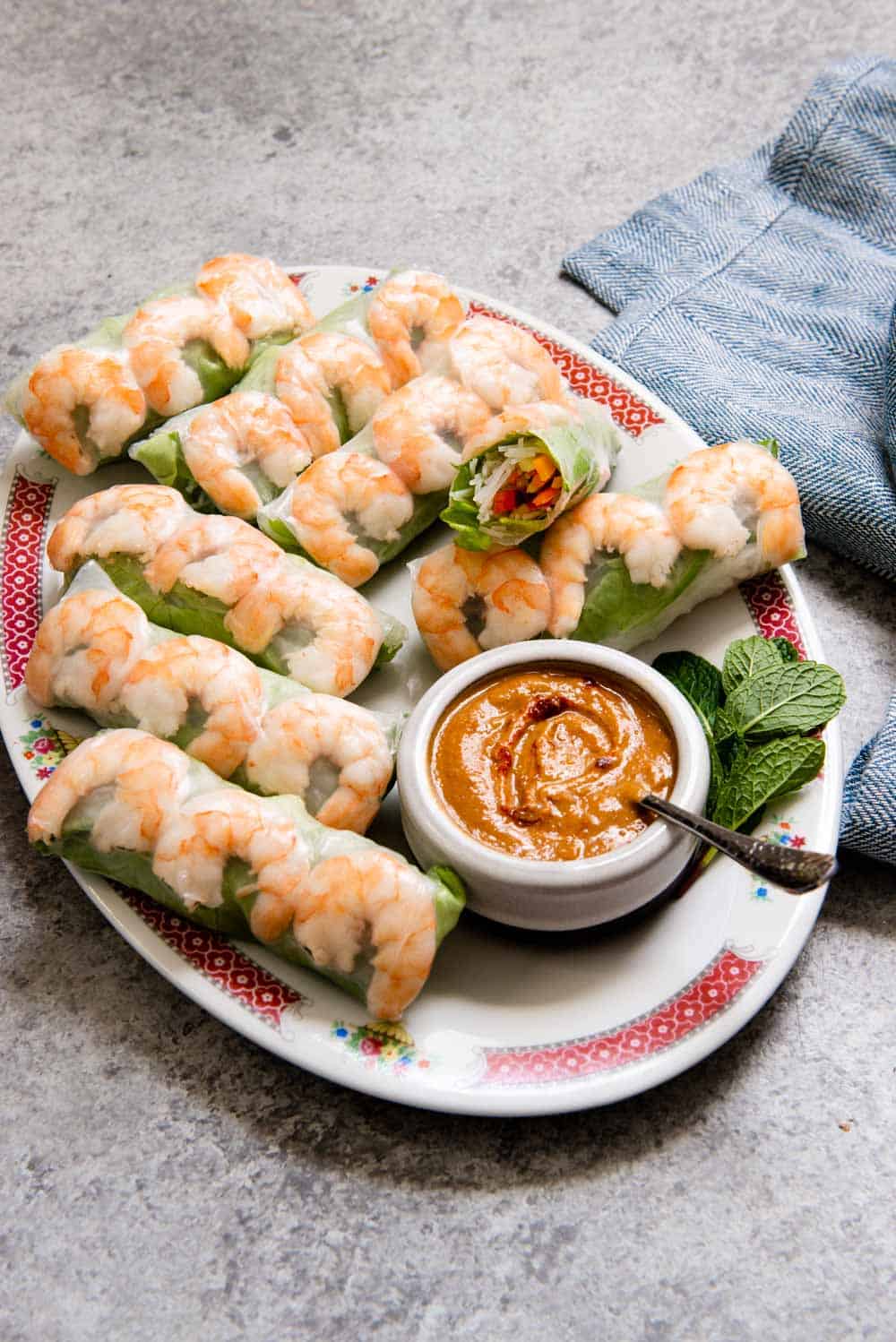

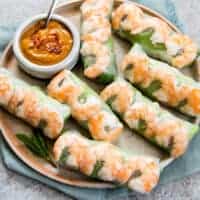

Selena M says
Is there a way to make these in advance? They seem to dry quickly if you don’t eat them ASAP, right?
Lisa Lin says
Hi, Selena! You can make them a few hours ahead. Place them on plates (NOT paper plates because they will stick) Cover it with a lightly damp towel and leave it out at room temperature, and they should stay soft. Make sure the towel isn’t extremely wet. Plastic wrap should work too.
Stine says
Fabulous! I’m so happy I came across this page as I would have never thought I’m capable of making such a dish myself – turns out, I am 😊
Wrapping the rolls is fairly easy but took me a bit of time when starting with the first ones. Only thing I still want to improve is the peanut sauce as mine didn’t come out so creamy. Probably because I only had chunky peanut butter so it didn’t mix as well with the liquids.
Lisa Lin says
Hi, Stine! Thank you so much for making this! If you ever notice your peanut sauce being thick again, mix in a little more liquid (any of the seasonings or even a few teaspoons of water).
Lesa says
Can you make i advance and freeze them?
Lisa Lin says
The rice paper texture won’t be as soft as fresh ones. In fact, they will probably form a hard crust, and you’d have to steam to soften.
Kathleen Dickson says
I made them! Used Shirataki angel hair, instead of rice noodles (which was very successful), omitted the red bell pepper and the mint (hate mint and did not think Inwoukd lije tge red bell pepper in these). I made the peanut sauce and Nuróc Châm, along with my own sauce made with plain yogurt and Sriracha sauce. I liked the Nuróc Châm the best with these. Tgese were very easy, except my rolling skills need improvement. I do not see a place to post a photo, but posted on my fb page https://www.facebook.com/kathleen.eagles.39 .
Cynthia Fenner says
Every where I have travelled these are called summer rolls. Spring rolls are fried.
Jane says
I have made these Spring Rolls twice now. Getting better each time. This time I used artificial crab. It was still delicious. Instead of lettuce I used thinly sliced mini cucumbers and grated my carrots. Loved both the sauces. Thank you for sharing this recipe.
Rissa says
Hi!
I know this is a silly question but I’m just curious. I thought that ones made with translucent rice paper were called “summer rolls” but most recipes I research with this type of context it does indeed say spring rolls.
Not a big deal either way just curious! I plan to make these this weekend!!
Naty says
My first time to see this it looks like it is really healthy so I subscribe right away I’m having abdominal problems and it looks like this will suit me thank you for your post I will start with your spring rolls because I in Vietnamese stores so I’m glad I found you thank you very much Lisa , have a good day!
V says
I just wanted to provide some feedback on the peanut sauce – I followed the recipe and it was very watery (I used Adams Smooth Peanut Butter). I had to half the amount I made, add another 1/4 cup of peanut butter plus some more soy, sesame oil and vinegar. I think next time, I’ll make it without the water and add water as I go if it needs it.
Audrey says
I had milk instead of water and it’s much creamier:)
JT says
I agree on it being way too watery – I looked up another recipe for comparison, and for a comparable amount of peanut butter, it said to add 1-2 tablespoons of water IF NECESSARY. 1:1 is definitely too much.
CC says
I just wanted to say you have a very user friendly recipe site! I have never commented on one before but I like your style. I was looking for a recipe for Nuoc Cham and found you.
For those who have issues with the peanut sauce, it depends on the brand- if it’s thin don’t add so much water, if it’s thick add boiling water!
Thanks Lisa for sharing your knowledge and honoring your heritage!
CC says
Update: So I made these in advance- I lined a large plastic container with parchment paper & sprayed it with pan release spray. I layered them using the sprayed parchment paper between, sprayed the top layer of spring rolls and sealed them tightly with the matching container lid. Refrigerate.
I did them the morning of a party so about 8- 10 hours in advance and they were perfect!
*I used red cabbage instead of the cucumber
Lisa Lin says
THANK YOU for these refrigeration tips! I really appreciate it!
Lisa Lin says
Thank you, CC!!
Monique says
Do you need to bake them in the oven or microwave or just like that before serving
CC says
Can use them directly from the refrigerator. The veg stay crispy and shrimp stays fresh!
Deirdre says
I just made something based on this recipe.
Shredded organic Cabbage, Kombu, Kale, Carrot and garlic in miso, ginger, agave, black pepper and few drops of rice wine vinegar dressing (not too wet, and not too much) and wrapped in the rice paper sheets. Trial and error led me to the technique of soaking the sheets for at least a minute in the tepid/lukewarm water and taking my time to roll them, let them sit for a minute to ‘glue’ shut, then fry them at not-too-hot sunflower oil. Move them around with a silicon spatula/spoon. They take about five minutes to cool, so you can make them at a nice pace and serve them whilst you carry on making them.
Lovely. I would use only one teaspoon of miso next time and I forgot to mention that you toss the vegetables really well with the dressing and add a little bit of oil to help coat every bit of veg with the dressing.
Brenda Shiels says
Can you help me figure out how to stop the rice paper from sticking to the wet cutting board?
Lisa Lin says
If that’s an issue, you can lay the rice paper over a damp kitchen towel instead.
Ron says
Delicious and easy to do. I find it best to place the wet rice paper on a ceramic plate and not a wood cutting board as the wood draws out the moisture in the rice paper. (to answer some ones question) They only slightly stick to the plate which is helpful when rolling them snug.
This recipe is quite simple and tasty.
I saw a variation that puts some Mayo on the lettuce and it does add another layer of flavor.
I used basil leaves as I had more of them than mint leaves available. It was fine.
To add some flavor to the carrots you can pre-pickle them in sugar, salt, and rice vinegar, then toss them, set aside 5-10 minutes, then drain.
Thanks for the recipe with the different sauces.Very fun to make and depending if you have pork or shrimp or just plain vegan they are wonderful.
Brenda says
This looks like a great spring roll recipe but there is no link to the video mentioned that I can see. I would love to see that — any chance of reposting?
Lisa Lin says
Hi Brenda! Turn off your ad blocker, and you’ll be able to see the video (it has to do with the video player I use to embed the video)
Julie says
Hi Lisa!
I haven’t made them yet but I want to. Any ideas for an alternative to the shrimp that will still make it relatively easy for rolling? Seafood allergy 😔. Thanks 🙏
Lisa Lin says
Avocados or sliced cucumbers are great alternatives!
Dr. Rben S. Cedeno says
Thanks for the advice, I used seasoned cut-up shrimp along with the rice noodles, lettuce and some vegetable. I will try the cucumbers and avocados.
Lisa Lin says
Awesome! Glad the directions helped!
Dr Ruben S Cedeno says
Quite simple instructions very informative, I saw what I was doing wrong…did not think about wetting the cutting board…I also left the skins in the water too long…hard to handle
Thanks, I’ll be doing much better from now on……;-)
Ruben
Katharine says
What can I serve with them for a luncheon? Keep ideas simple please!
Lisa Lin says
Side salads like my smashed cucumber salad is great. I usually make this for my family with my egg fried rice and teriyaki tofu. All of these recipes are on the site!
John says
Thanks for your recipe. Making pho next.
Lisa Lin says
Thanks, John!
Betsy Miller says
Just like I had in restaurants and always wished to make. Delicious! Thankyou very much, light and nutricious.
Lisa Lin says
Thanks, Betsy!! Glad you enjoyed it!
Jeanne says
Thanks so much for sharing. You’re very talented. One of my all time favorite recipes. I always get asked to make and bring them to parties. Thank you for the rolling tips. I was piling the shrimp on top of everything else. Spacing them out and putting them on the flat rice paper makes it much easier to roll. I’m a peanut sauce gal too. 😊
natalia says
hi i had leftover rice noodles. how can i reheat them for the next day?
Lisa Lin says
I usually just heat them in the microwave on a plate for 30 to 45 seconds.
song Nguyen says
Origin Vietnamese spring roll always has Chive
Caroline Morse says
I love spring rolls and your post will help me perfect my ‘style’ … one question I don’t seem to find the answer to – when you lay down the damp wrapper, do you lay it down smooth or rough side to the veggies … I always assumed the rough side should go up but want verification :). Thank you again for your post
Lisa Lin says
Hi Caroline. For this recipe, I don’t really mind which side the rice paper goes down. However, if you want a smoother texture to bite into, yes, the rough side should go up so that it’s wrapped with the vegetables.
Marissa Feliciano-Arruda says
I love your Vietnamese spring rolls
Julia says
Super tasty recipe! I adjust it a little bit, though. If you’re making the peanut sauce, add the water little by little! It might just be because I live in Japan and the peanut butters here aren’t very thick, but I made the mistake of adding all the water in the recipe and my sauce broke apart and was very watery. I avoided this mistake the next time I made this recipe and it was perfect! The directions were so easy to follow. This was my first time making spring rolls at home and I really enjoyed it!
Kat says
Recipe not great, peanut sauce was terrible really not like how it was in Vietnam
A small world cup says
Vietnamese spring rolls is my favorite. Thank for your recipe
Stanton Kaye says
Thank you
Alex says
I don’t understand cutting the shrimp. In all the pictures the shrimps aren’t cut
jeffrey j biggins says
love the recipe.I added cilantro to the roll.MMM-MMM
Effie says
This was very easy to make and flavors were balanced and perfect! My daughter lives Vietnamese food and said it was “next level.”
Lisa Lin says
Thank you, Effie!!
joey says
hi Lisa i thank you for sharing your great recipe looks delicious i love those rolls nice with vietnamese noodle soup anything else you can share see you next time God bless…Joey from Canada
Carsten Konow says
Really well explained and really good documentation. Thank you very much.
Renee says
I was introduced to these Spring Rolls at a Farmers Market almost 15 yrs ago. I’ve been making them for a few years now. I’ve been using Mung Bean noodles ( I thought that was the type of noodles used and I love how you just soak those and no cooking) aside from the bean vs rice ingredient swap does that matter for spring rolls? Another question is while I have been using the round rice wraps, is there a difference between the round vs the square in use and texture? Are the square wraps just used for fried spring rolls and not the fresh spring rolls?
Christine C says
By far the most authentic and thorough recipe I’ve found! The peanut sauce was impeccable – I tried following other recipes online but they all turned out too dry/bland/etc. I didn’t have maple syrup so I subbed Mirin (a sweetened sake) for added sweetness. I also like the small touches like how to arrange the shrimp so they appear on the outside. *chefs kiss* thanks for sharing!
Kay L Logan says
I love this recipe it is the perfect spring roll. I have a question, my were very sticky. How do I prevent that?
Lisa Lin says
There’s no easy answer to this, as moistened rice paper will be sticky. The only way to prevent it is to wrap each roll in plastic wrap (like they do with take out) or maybe separate them with parchment paper.
Teresa McEwan says
There is a smooth side and a patterned side to the rice paper. Which side goes on the board?
Love these spring rolls and looking forward to making them with my grand kids tonight.
Lisa Lin says
Hi Teresa, for these spring rolls, it doesn’t really matter which side faces the board.
Five Nights At Freddy's says
U have the most exciting recipes… I really look forward to trying ur recipes!! And everything I’ve tried so far becomes a staple!!!! Thank u.
candy clicker says
I never thought I could make this dish. Your website is amazing